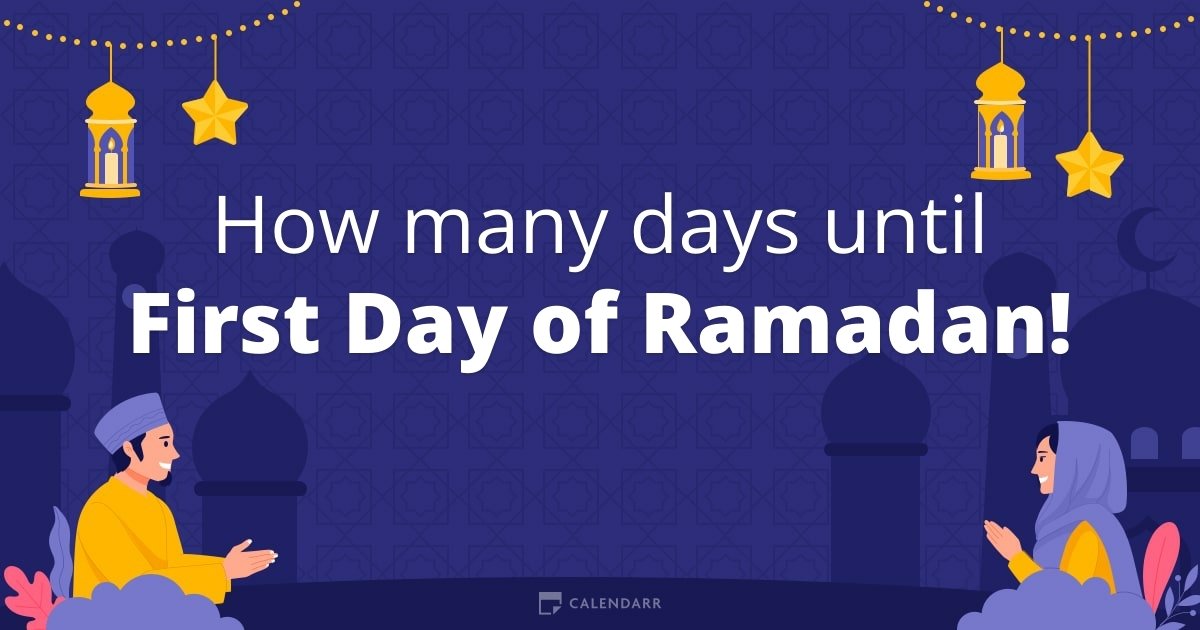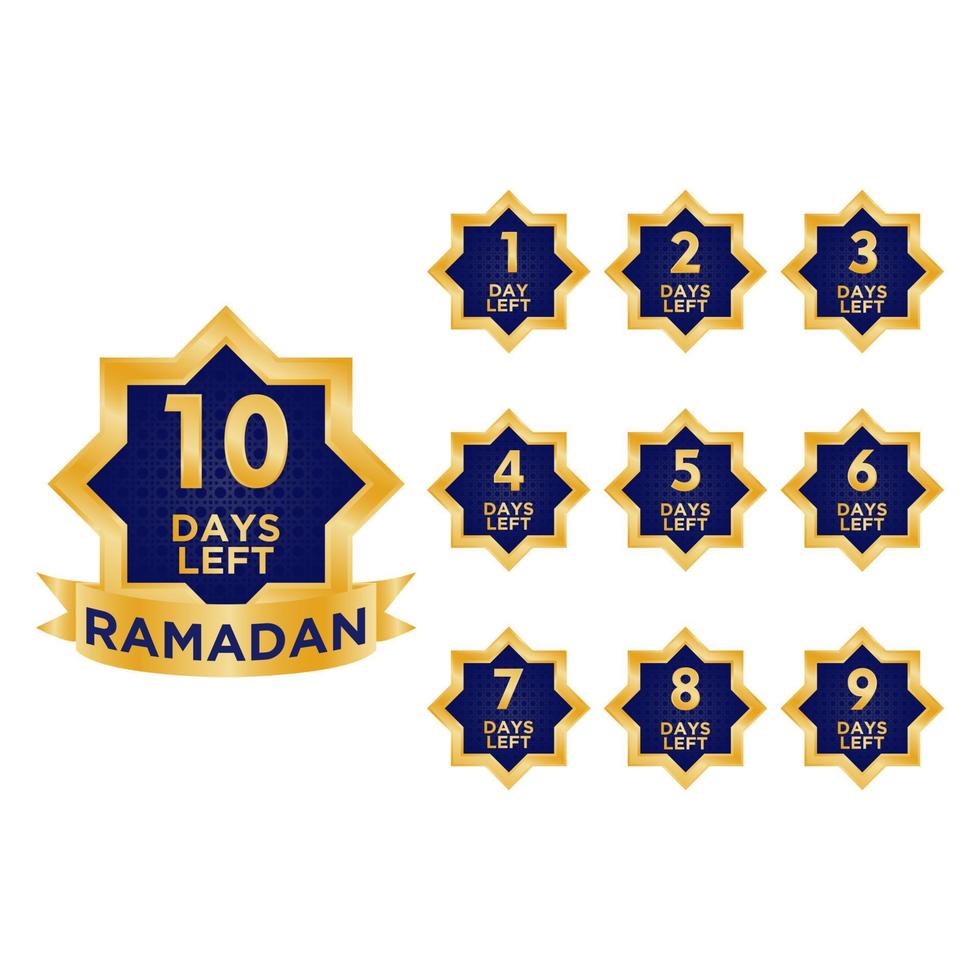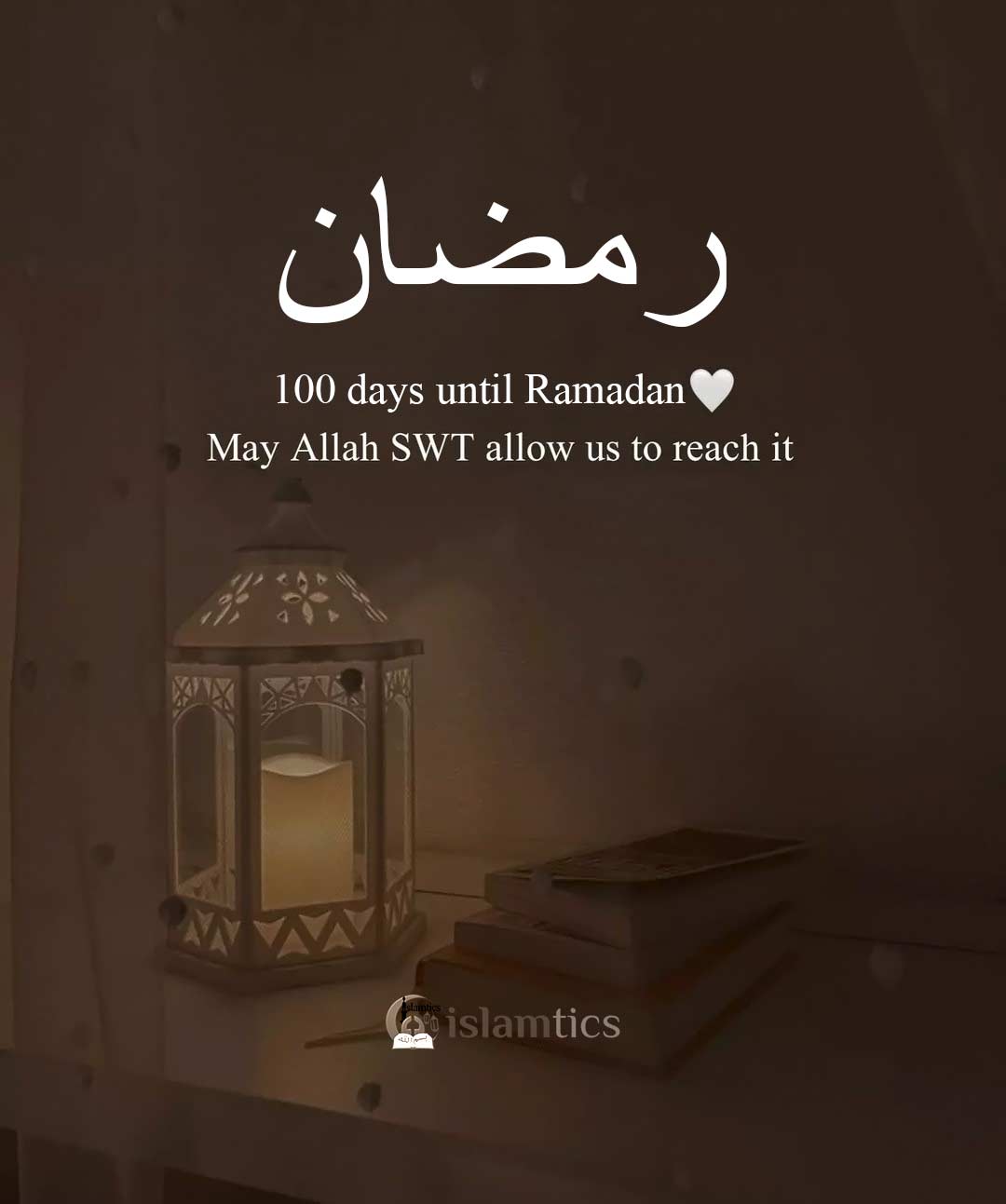Ramadan How Many Days Left: Preparing For The Holy Month Of Fasting In 2025
Are you wondering, perhaps, just how many days are left until Ramadan begins, or maybe when this significant time will come to a close? It's a question many people have, especially as the calendar pages turn. This very special month holds deep meaning for Muslims all around the world, and knowing the dates ahead of time can help you get ready for its arrival. We'll explore the upcoming dates for Ramadan 2025, so you can clearly see the timeline for this period of fasting, prayer, and community connection.
Understanding the timing of Ramadan, you know, is quite important for those who observe it. It’s not just about counting the days, but also about getting ready for a period of profound spiritual focus. This article aims to give you all the details you might need, drawing on reliable sources like Islamicfinder’s Ramadan calendar 2025, which provides a very clear picture of the fasting times, including the Sehr schedule and Iftar timings for various places, along with complete prayer times.
So, we'll cover when Ramadan 2025 is set to start and finish, how its dates are decided, and what this holy month truly means for the billions of Muslims who take part. It's about more than just dates; it's about reflection, communal prayer, and a deep sense of togetherness, as a matter of fact. Let's find out exactly when this sacred time will begin and how long it lasts.
- Tamilblasters New Link 2024 Your Ultimate Guide To Tamilrockers Alternatives.linkmaz
- Unlock The Secrets Of Game9lat Coconut Your Ultimate Guide.linkmaz
- Bratty G Baby On Tiktok Onlyfans What You Need To Know.linkmaz
- Andie Elle Leak.linkmaz
- Vegamoviesst Your Ultimate Destination For Movie Entertainment.linkmaz
Table of Contents
- What is Ramadan?
- When Does Ramadan 2025 Start?
- What Happens During Ramadan?
- The End of Ramadan: Eid al-Fitr
- Understanding the Ramadan Calendar
- Why Ramadan Matters to Muslims
- Frequently Asked Questions
What is Ramadan?
Ramadan, you know, is the ninth month of the Islamic calendar. It's observed by Muslims all over the globe as a truly special month for fasting, which is called sawm, for communal prayer, known as salah, for reflection, and for building a stronger sense of community. This month is a very important pillar of Islam, offering a time for spiritual growth and drawing closer to one's faith. It is, in a way, a period of deep personal and collective devotion.
It's also known by a few different names, like Ramadhaan or Ramazan, but the meaning stays the same. This holy month is celebrated as the time during which Muhammad received the initial revelations, making it a period of immense spiritual significance. So, it's not just about abstaining from food and drink; it's about connecting with the origins of faith and deepening one's spiritual journey, you see.
The Islamic calendar, which is sometimes called the ‘Hijri calendar’ because it marks the migration, is a lunar calendar. This means that the start of each month, including Ramadan, depends on the sighting of the crescent moon. Because of this, Ramadan cycles through all the seasons over time, which, you know, makes each year's experience a little different depending on when it falls. This lunar basis means the dates shift each year compared to the Gregorian calendar.
- Sone385 The Game Changer In The World Of Technology.linkmaz
- Hair Shampoo For Hair Loss.linkmaz
- Bollyflixspa Your Ultimate Destination For Bollywood Entertainment.linkmaz
- Hdhub4u Pro Your Ultimate Guide To Highquality Movie Downloads.linkmaz
- Fikfap.linkmaz
When Does Ramadan 2025 Start?
Many people are, quite naturally, curious about the exact start date for Ramadan each year. For 2025, we have some good information to help you plan. The start of this holy month is determined by the appearance of the waxing crescent moon, which can lead to slight variations depending on where you are in the world. This is a very traditional way of marking the beginning of the month, so it's always a bit dependent on observation.
The Lunar Calendar and Moon Sighting
The Islamic calendar, as we've talked about, is a lunar calendar. This means its months are tied to the cycles of the moon. The beginning of Ramadan, in particular, hinges on the sighting of the crescent moon after the new moon. This tradition is deeply rooted in Islamic practice, and it means that the exact start date can vary by a day or so depending on geographical location and actual moon visibility. So, it's not always a fixed date on the solar calendar, you know, which makes it a bit unique.
Because of this moon sighting, different communities or regions might begin Ramadan on slightly different days. For instance, in some places, the moon might be visible a day earlier than in others. This practice, you know, emphasizes community observation and local determination, making it a very human and shared experience. It's a living tradition that connects observers to the natural world and to each other.
Ramadan 2025 Dates
For 2025, based on general predictions and calendars like Islamicfinder’s Ramadan calendar, the start of Ramadan is expected to be after sundown on Friday, February 28. This means the first full day of fasting would then be Saturday, March 1. It's a pretty consistent projection, though, as mentioned, the final confirmation comes with the moon sighting.
The month of Ramadan, which typically lasts 29 or 30 days, is then set to end on Saturday, March 29, or Sunday, March 30, also depending on the moon's sighting. So, in essence, it's a month-long period of devotion and practice. For example, Ramadan 2025 in Phoenix, Arizona, USA, is set to begin on February 28 and end on March 30, marking 30 days of fasting, Taraweeh prayers, and spiritual devotion for Muslims in that area. This gives you a really clear idea of the expected duration, you see.
How Many Days Until Ramadan 2025?
To figure out how many days are left until Ramadan 2025, you would need to count the days from today's current date, which is October 26, 2024, until February 28, 2025. Let's break that down, shall we?
- Days remaining in October 2024: 5 days (Oct 27, 28, 29, 30, 31)
- Days in November 2024: 30 days
- Days in December 2024: 31 days
- Days in January 2025: 31 days
- Days in February 2025: 28 days (until Feb 28th)
So, if we add those up: 5 + 30 + 31 + 31 + 28 = 125 days. Therefore, from today, October 26, 2024, there are approximately 125 days left until Ramadan 2025 is expected to begin after sundown on Friday, February 28, 2025. This count is, you know, based on the Gregorian calendar and the projected start date, giving you a pretty good estimate for planning purposes.
And how many days will Ramadan 2025 last? Based on the information, it will last 30 days, ending around March 29 or March 30, depending on the moon sighting. This means the fasting period itself will span about a month, which is quite a significant commitment. Knowing this duration helps people plan their schedules and activities during this holy period, in a way, allowing for proper preparation and spiritual focus.
What Happens During Ramadan?
Ramadan is a time of deep spiritual practice and community engagement for Muslims worldwide. It's a month that brings people together in shared devotion and acts of kindness. The core practices during this month are fasting, prayer, and acts of charity, all of which are, you know, aimed at purifying the soul and strengthening one's connection with faith. It's a period of heightened spiritual awareness, truly.
Fasting from Dawn to Dusk
The most widely recognized practice during Ramadan is fasting, known as sawm. Observant Muslims worldwide will soon be united in a ritual of daily fasting from dawn to sunset. This means abstaining from all food, drink, and other physical needs during daylight hours. It's not just about hunger and thirst, though; it's also about controlling desires and focusing on spiritual matters. This act of self-control is, you know, a very important part of the spiritual journey during this month.
Before dawn, Muslims have a meal called Sehr or Suhoor, which provides energy for the day's fast. After sunset, the fast is broken with a meal called Iftar. This breaking of the fast is often a communal event, bringing families and friends together to share food and blessings. It's a time of joy and gratitude, really, after a day of abstinence. These meals frame the daily experience of fasting, making it a structured and shared practice.
Communal Prayers and Reflection
Beyond fasting, Ramadan is a month of intensified prayer and reflection. Muslims engage in communal prayers, especially the special evening prayers known as Taraweeh, which are performed after the nightly Iftar. These prayers can be quite long and are often recited in congregations at mosques. This communal aspect of prayer, you know, really reinforces the sense of unity among believers.
It's also a time for increased reading of the Quran, the holy book of Islam. Many Muslims try to complete a full reading of the Quran during Ramadan. The month encourages introspection, self-assessment, and a renewed commitment to one's faith. People often spend more time in personal devotion, thinking about their actions and seeking closeness to their Creator, which is, you know, a very personal journey.
Community and Giving
Ramadan fosters a strong sense of community and empathy. Muslims are encouraged to give to charity, known as Zakat and Sadaqah, particularly to those less fortunate. This act of giving is seen as a way to purify wealth and help those in need, reflecting the month's emphasis on compassion and social responsibility. Sharing food with neighbors and the poor is also a very common practice, you see, strengthening social bonds.
The communal Iftars, where people gather to break their fasts together, are a testament to this spirit of togetherness. Mosques often host large Iftar dinners, welcoming everyone to share in the blessings of the month. This focus on community, you know, helps to build stronger connections and a collective sense of purpose, making Ramadan a truly unifying experience for many.
The End of Ramadan: Eid al-Fitr
The conclusion of Ramadan is marked by a major celebration called Eid al-Fitr, which means "Festival of Breaking the Fast." This joyous occasion begins immediately after the sighting of the new moon that signals the start of the next month, Shawwal. It's a day of great happiness and gratitude, marking the successful completion of the month-long fast. People gather for special Eid prayers in the morning, which are, you know, often held in large open spaces or mosques.
On Eid al-Fitr, families and friends visit each other, exchange gifts, and enjoy festive meals. Children often receive new clothes and money. It's a time for forgiveness, reconciliation, and expressing thanks for the blessings received during Ramadan. The atmosphere is one of pure celebration and togetherness, really, after a month of spiritual discipline. This holiday, you know, is a well-deserved reward for the efforts put in during Ramadan.
Understanding the Ramadan Calendar
For those observing Ramadan, having a reliable calendar is very helpful. Islamicfinder’s Ramadan calendar 2025, for example, provides detailed fasting times, including the Sehr schedule and Iftar timings for your country, along with complete details of prayer times. This kind of resource is, you know, truly invaluable for daily planning and observance.
Sehr and Iftar Timings
The Sehr (pre-dawn meal) and Iftar (post-sunset meal) timings are crucial for daily fasting. These times change each day as the sunrise and sunset times shift throughout the month, depending on your location. A good Ramadan calendar will provide precise timings for these meals, allowing observers to begin and end their fasts at the correct moments. This precision, you know, helps ensure the fast is observed correctly.
For instance, the calendar will show the exact minute when fasting begins at dawn and when it ends at sunset. This information is vital for Muslims to plan their meals and daily routines during Ramadan. Without these precise timings, it would be quite challenging to maintain the fast accurately, so, having a detailed schedule is very important for daily life during this month.
Finding Local Prayer Times
In addition to fasting times, Ramadan calendars also provide prayer times for your specific location. This includes the five daily prayers, which are observed throughout the year, but also the special Taraweeh prayers performed during Ramadan evenings. Being able to access accurate prayer times, you know, helps Muslims organize their day around their spiritual obligations.
Many online platforms and apps, like those that provide Islamicfinder’s Ramadan calendar, allow you to get prayer times for your current location or search for your town or city. You can even select the prayers you wish to download, making it very convenient for daily use. This accessibility, you know, ensures that Muslims everywhere can easily follow the prayer schedules, no matter where they are.
Why Ramadan Matters to Muslims
Ramadan is, at its core, a deeply personal and collective spiritual journey for Muslims. It's a month that encourages introspection, self-discipline, and a heightened sense of devotion. The act of fasting from dawn until dusk is not merely about abstaining from food and drink; it's a practice meant to purify the soul, strengthen one's willpower, and foster empathy for those less fortunate. This self-restraint, you know, is seen as a way to grow spiritually and become more mindful of one's actions and intentions.
The month also serves as a powerful reminder of the importance of community and giving. The communal prayers, shared Iftars, and increased charity during Ramadan strengthen bonds among Muslims and promote a spirit of generosity. It's a time when people come together to support each other in their spiritual endeavors and to extend kindness to everyone around them. This collective experience, you know, reinforces the sense of unity within the global Muslim community, making it a truly unifying period.
Ramadan, in essence, is a period for spiritual renewal and growth. It's a chance to reset, reflect on one's life, and recommit to the teachings of Islam. Many Muslims feel a profound sense of peace and spiritual closeness during this month. It's a time when faith feels particularly vibrant and alive, encouraging individuals to improve their character and deepen their connection with their Creator. This makes it, you know, a very cherished and anticipated time of year for observant Muslims.
Frequently Asked Questions
When does Ramadan 2025 begin?
Ramadan 2025 is expected to begin after sundown on Friday, February 28, with the first full day of fasting on Saturday, March 1. The exact start date, you know, depends on the sighting of the crescent moon, which can vary slightly by location, but this is the widely anticipated date.
How long is Ramadan?
Ramadan lasts for 29 or 30 days, depending on the sighting of the moon that signals the end of the month and the beginning of Eid al-Fitr. For 2025, it is generally expected to last 30 days, concluding around Saturday, March 29, or Sunday, March 30. So, it's about a month, basically.
What is the significance of Ramadan for Muslims?
Ramadan is a holy month of fasting, introspection, and prayer for Muslims worldwide. It is celebrated as the month during which Muhammad received the initial revelations. It's a time for spiritual purification, self-discipline, communal prayer, and increased acts of charity, fostering a deeper connection with faith and community. It's, you know, a very important time for spiritual growth.
Learn more about Ramadan on our site, and for precise timings for your location, you can check out Islamicfinder's Ramadan calendar 2025.
- Hd4hub Hindi Dubbed Movie Your Ultimate Guide To Entertainment.linkmaz
- Sydney Sweeney Naked.linkmaz
- Iradha Telugu Movies Com.linkmaz
- Aishah Sofey Leaked.linkmaz
- Is Kash Patel Gay The Truth Behind The Speculation.linkmaz

How Many Days Are Left For Ramadan 2025 - Mason P. Neese

How Many Days Left Till Ramadan 2024 - Casey Raeann

How Many Days Left Until Ramadan 2024au - Liana Dulcine